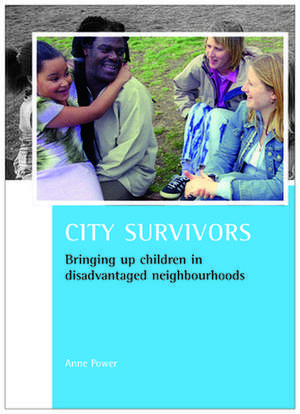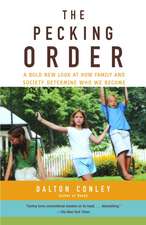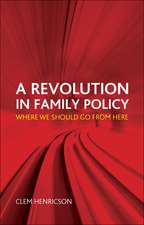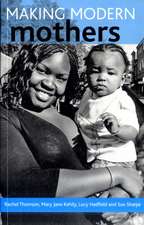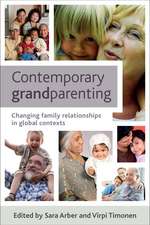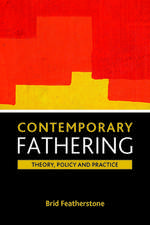City survivors – Bringing up children in disadvant aged neighbourhoods: CASE Studies on Poverty, Place and Policy
Autor Anne Poweren Limba Engleză Paperback – 21 noi 2007
Seen through the eyes of parents, mainly mothers, City survivors tells the eye-opening story of what it is like to bring up children in troubled city neighbourhoods. The book provides a unique insider view on the impact of neighbourhood conditions on family life and explores the prospects for families from the point of view of equality, integration, schools, work, community, regeneration and public services. City Survivors is based on yearly visits over seven years to two hundred families living in four highly disadvantaged city neighbourhoods, two in East London and two in Northern inner and outer city areas. Twenty four families, six from each area, explain over time from the inside, how neighbourhoods in and of themselves directly affect family survival. These twenty four stories convey powerful messages from parents about the problems they want tackled, and the things that would help them. The main themes explored in the book are neighbourhood, community, family, parenting, incomes and locals, the need for civic intervention. The book offers original and in-depth, qualitative evidence in a readable and accessible form that will be invaluable to policy-makers, practitioners, university students, academics and general readers interested in the future of families in cities.
Din seria CASE Studies on Poverty, Place and Policy
-
 Preț: 328.02 lei
Preț: 328.02 lei -
 Preț: 350.52 lei
Preț: 350.52 lei -
 Preț: 331.33 lei
Preț: 331.33 lei -
 Preț: 329.41 lei
Preț: 329.41 lei -
 Preț: 334.62 lei
Preț: 334.62 lei -
 Preț: 331.33 lei
Preț: 331.33 lei -
 Preț: 321.71 lei
Preț: 321.71 lei -
 Preț: 370.23 lei
Preț: 370.23 lei - 23%
 Preț: 778.12 lei
Preț: 778.12 lei -
 Preț: 502.16 lei
Preț: 502.16 lei -
 Preț: 280.18 lei
Preț: 280.18 lei
Preț: 332.39 lei
Nou
Puncte Express: 499
Preț estimativ în valută:
63.61€ • 65.63$ • 53.84£
63.61€ • 65.63$ • 53.84£
Carte disponibilă
Livrare economică 11-25 februarie
Preluare comenzi: 021 569.72.76
Specificații
ISBN-13: 9781847420497
ISBN-10: 1847420494
Pagini: 232
Dimensiuni: 172 x 240 x 12 mm
Greutate: 0.54 kg
Editura: Bristol University Press
Seria CASE Studies on Poverty, Place and Policy
Locul publicării:United Kingdom
ISBN-10: 1847420494
Pagini: 232
Dimensiuni: 172 x 240 x 12 mm
Greutate: 0.54 kg
Editura: Bristol University Press
Seria CASE Studies on Poverty, Place and Policy
Locul publicării:United Kingdom
Recenzii
Anne Power has built up a formidable reputation for grasping the daily dilemmas of Britain's poor neighbourhoods and this book is one of her best. It's a vivid portrait of the struggles so many people face, and brilliantly uses its ethnographic material to show how much people's quality of life depends on others - in the family, the neighbourhood and the wider society. Geoff Mulgan, Director, The Young Foundation
Anne Power's illuminating and important book bears witness to the lives of urban families, without whose presence all cities would wither and decline. The parents she interviews describe in detail how noisy, messy, often unsafe environments inform every decision they make about their lives and those of their children. If Power's recommendations, based on interviews with 200 'city survivors', are heeded, families may no longer have to 'survive' the city, but instead will thrive in it. Lynsey Hanley, author of 'Estates: An Intimate History'
..the real strength of this book is its capacity to allow the words of the residents of deprived neighbourhoods to shine through. Urban Geography Research Group, urban-geography.org.uk 2008
Notă biografică
Anne Power is Professor of Social Policy at the London School of Economics and Political Science; Sustainable Development Commissioner responsible for regeneration and sustainable communities; member of the Government's Urban Task Force; author of books on cities, communities and marginal housing areas in the UK and abroad.
Cuprins
Introduction: city survivors; Neighbourhoods matter: is it the people or the place?; Community matters: survival, instincts in social animals; Families matter: mothers carry the weight; Parenting matters: pushing for kids; Incomers and locals: a shrinking pot?; City survival within precarious communities: who pays the price of change?; Conclusion: cities need families.
